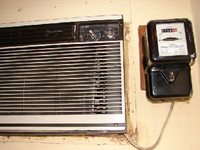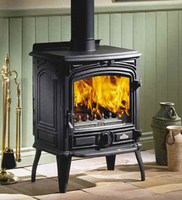

Even in the south of France, there can be extremes of weather and winters can be cold. Unless you plan to visit a property only in the summer, you need to consider central heating, although air-conditioning is a luxury.
Central heating systems in France may be powered by electricity, gas, oil, solid fuel (usually wood) or even solar power (see below). According to the Ministry for Industry, 100KWh of heating costs around €11 using electricity, €4.25 using natural gas, €8 using bottled gas and €6.50 using oil. Whatever form of heating you use, it’s essential to have good insulation, without which up to 60 per cent of heating is lost through the walls and roof. Insulation is given a high priority in France, particularly in new homes. Some 65 per cent of French homes have central heating, which is essential if you wish to let your home during winter.

Many people keep their central heating on a low setting (which can be controlled via a master thermostat) during short absences in winter to prevent pipes from freezing. Note that it can be very expensive to heat a large house, particularly one without good insulation.
If you need to install a hot water boiler and immersion heater, ensure it’s large enough for the size of the property, e.g. one room studio (100 litres), two rooms (150 litres), three to four rooms (200 litres) and five to seven rooms (300 litres).
Information and advice on alternative heating systems and cost-saving can be obtained from the Agence de l’Environnement et de la Maîtrise de L’Energie – look in the information pages of your telephone book or contact ADEME ( 08 10 06 00 50, http://www.ademe.fr – available in English) for details of where to find your nearest Point Info Energie (PIE) – and from the CSTB, part of the Ministère du Logement, Direction Générale de l’Urbanisme, de l’Habitat et de la Construction ( http://www.cstb.fr – available in English).
Electric central heating is the most common form in France, particularly in modern homes with good insulation and a permanent system of ventilation, and is inexpensive to run using off-peak storage heaters. However, electric central heating isn’t recommended for old properties with poor insulation. If you install an electric central heating system, you must usually uprate your electricity supply to cope with the extra demand. Efficient electric heating (and cooling) is provided by air-conditioning units (also known as air-to-air pumps), which consume up to 75 per cent less electricity than conventional electric heating systems and are also kinder to the environment and cheaper to install – especially as a 40 per cent tax reduction on installation costs is available. Note that some stand-alone electric heaters are expensive to run and are best suited to holiday homes.
Gas central heating is popular in towns with mains gas and is the cheapest to run. Gas is clean, economical and efficient, and the boiler is usually fairly small and can be wall-mounted. In rural areas where there’s no mains gas, you can have a gas tank (citerne) installed on your property. You will need space for the tank, which must be installed at least 3m (10 ft) from the house. Tanks can be hired, from suppliers such as Total and Antargaz, for around €300 per year, or you can pay a deposit of around €1,500, which is refunded if you take out a contract for the supply of gas for a fixed period. Note that piping adds to the already considerable cost of a gas tank, the system needs regular maintenance, and having a gas tank on your property will increase your household insurance.
Around 27 per cent of French homes use an oil-fired heating system (chauffage au fioul). Heating oil costs around €0.35 per litre and is usually available from a number of local suppliers. As with gas, you need space to install the storage tank. A tank with a capacity of up to 2,000 litres can be located in the basement; a larger tank must be buried in your garden or stored in a separate location sheltered from frost and away from the house. Oil costs have risen dramatically in recent years and are now over €0.50 per litre. There are two grades of oil: ordinaire and premier; note that the only difference between them is that ordinaire freezes at around -15C and premier at around -25C, so you need pay extra for premier only if you have an outdoor tank and live in an area that experiences severe winters. You should expect to use around 2,000 to 3,000 litres per year to heat a three-bedroom house (including hot water). As oil causes a rapid build-up of deposits, it’s essential to have your system cleaned and checked annually (costing around €120) and to replace the jet regularly. Note also that you should wait at least four hours after an oil delivery before restarting your boiler, in order to allow any foreign bodies in the tank to settle to the bottom.
For information about the use of fuel for heating, contact Chaleur Fioul, an association of petroleum manufacturers, distributors and retailers (08 10 34 34 34, http://www.chaleurfioul.com ).
A solar power system can be used to supply all your energy needs, although in France it’s usually combined with an electric or gas heating system, as solar power cannot usually be relied upon year-round for heating and hot water. The main drawback is the high cost of installation, which varies considerably with the region and how much energy you require. The cost is between €2,000 and €5,000 for an installation sufficient to operate around eight lights and a small refrigerator (a solar power system must be installed by an expert), although a government grant is available to French residents under the Plan Soleil scheme; for details and to find an approved (‘Qualisol’) installer contact your regional ADEME office (08 00 31 03 11, http://www.ademe.fr – available in English).
The advantages are no maintenance or running costs and silent operation. A system should last 30 years (it’s usually guaranteed for ten years) and can be uprated to provide more power in the future. A solar power system can be used to provide electricity in a remote rural home, where the cost of extending electricity is prohibitive. Continuous advances in solar cell and battery technology are expected to dramatically increase the efficiency and reduce the cost of solar power.

Almost a quarter of France is covered by forest, and some 7m homes rely solely on wood-burning stoves (chauffage au bois) for their heating and hot water, particularly in rural areas, and millions more have wood fires for effect. Stoves come in a huge variety of sizes and styles and can be purchased secondhand from brocantes. Wood for fuel (which should have been seasoned for at least two years) is measured in stères. One stère is 1m2 of stacked wood, including the spaces between the logs, which normally account for between 20 and 40 per cent of the volume, and is roughly equivalent to 150 litres of oil. Check whether your commune supplies wood from local forests (affouage); otherwise you will need to find a commercial supplier (often a local farmer), who will charge around €35 per cubic metre.
The main disadvantages are the chores of collecting and chopping wood, cleaning the grate and lighting fires. Smoke can also be a problem. Note that an open fireplace (cheminée) can be wasteful of heat and fuel. An enclosed hearth with a glass door (insert) is more effective and often has the advantage of a hot-air chamber that warms other parts of a home, plus less heat wastage, a reduced fire hazard, and less ash and dust. Chimney sweeping (ramonage) costs around €35 to €50 and should be done at least once a year; although you can no longer be fined for failing to have your chimney swept regularly, your house insurance may be invalidated in the event of a fire if you haven’t done so.
The French government is encouraging homeowners to use ‘renewable’ energy sources and offers a range of grants towards the installation of solar-powered heating systems and wood-burning boilers, detailed below. In some regions, you can also obtain a grant for a geothermic system, which absorbs heat from the earth and transfers it to an underfloor heating system. Grants are available from your regional council (and vary with the region – go to http://www.conseil-general.com and click on the map) and from the Agence Nationale pour l’Amélioration de l’Habitat (ANAH, http://www.anah.fr ) if your home is more than 15 years old and your combined household income is less than around e17,500. Some grants are for principal residences only; others include holiday homes. Further information is available from the Agence de l’Environnement et de la Maîtrise de l’Energie (ADEME, http://www.ademe.fr – click on ‘Espace info énergie’ under ‘Espace particuliers’ to find your regional office). There are also a reduced rate of VAT and tax credits on installation costs in homes more than two years old. Note that grants can take a long time to be approved and even longer to be paid, and you may not be allowed to start work until approval has been granted.
Solar Power: Three types of system are normally eligible for grants:
Wood-burning Boiler: Must carry the ‘flamme verte’ label, denoting high efficiency, and be fuelled by wood chips or pellets supplied by approved firms. Two types of burner are eligible for grants:
In some regions of France, summer temperatures are often above 30C (86F) and, although properties are usually built to withstand the heat, you may wish to install air-conditioning (climatisation). Note, however, that there can be negative effects if you suffer from asthma or respiratory problems. You can choose between a huge variety of air-conditioners, fixed or moveable, indoor or outdoor installation, and high or low power. An air-conditioning system with a heat pump provides cooling in summer and economical heating in winter. Some air-conditioners are noisy, so check the noise level before buying one. Many people fit inexpensive ceiling fans for extra cooling in the summer.
Note that central heating dries the air and may cause your family to develop coughs. Those who find the dry air unpleasant can purchase a humidifier to add moisture to the air. Humidifiers that don’t generate steam should be disinfected occasionally with a special liquid available from pharmacies (to prevent nasty diseases). The French commonly use humidifiers, ranging from simple water containers hanging from radiators to expensive electric or battery-operated devices.
On the other hand, if you’re going to be using a holiday home only occasionally, it’s worthwhile installing de-humidifiers, especially in the bedrooms, to prevent clothes and linen going mouldy.
This article is an extract from Buying a home in France. Click here to get a copy now.